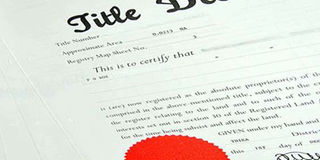Title deed: Extra costs associated with land buying

A sample of a title deed. Land buying is not a process that you can do on your own, so it is advisable to engage a lawyer for guidance. PHOTO | FILE | NATION MEDIA GROUP
What you need to know:
- The fee the lawyer charges depends on the agreement made between the buyer and the lawyer.
- When buying land, it is important to confirm with the owner whether the registration and transfer fee are included in the selling price.
Those conversant with land matters will tell you that there are two categories of land buyers: Those who are conversant with the entire process and those who are clueless, especially on the ‘other’ costs that come with the process.
Ms Caroline Wangari, chief executive officer and founder of Matla Group Limited, a company that deals with land matters, says that many first time land buyers need to know what exactly is required of them in the market place.
Here is a breakdown of some of the extra costs associated with land buying that every buyer should be familiar with:
HIRE A LAWYER
Land buying is not a process that you can do on your own, so it is advisable to engage a lawyer who will guide you, and even carry out some tasks on your behalf.
“Some of these tasks include carrying out background checks and searches which are meant to confirm that indeed the land that you intend to buy actually does exist. This is done by running the seller’s documents through the lands registry,” Ms Wangari says.
“They will also help you come up with sale agreements as well as letters of offer.”
All this will come at a cost, commonly known as the legal fee. Caroline notes that the fee the lawyer charges depends on the agreement made between the buyer and the lawyer.
Some will claim a percentage of the total land value while others will give a fixed amount as the fee.
CLEARANCE
When buying land, it is important to confirm with the owner whether the registration and transfer fee are included in the selling price, or whether it will come as an additional charge on top of the quoted buying price.
Before buying any piece of land, one has to be cleared by the Land Control Board.
This board holds forums that make sure that the sale and transfer of the land is approved, and that the seller of the land in question is willing to sell, and that the buyer is willing to do so, meaning that none of them is being coerced to carry out the transaction.
The board also ensures that the land transfers in the area are transparent.
“If the board is convinced that the land transaction is good to go, they will offer a letter of consent, a process that can take up to a month. The general charge for this is Sh1,000, but if you are in a hurry to acquire the land, you can request for a special board forum where you will pay an extra amount of money for this special sitting,” Ms Wangari says.
BROKER
Most of the times when land is being sold or bought, there are brokers involved. The Law Society of Kenya (LSK) gives some regulation as to how much the broker should be paid.
“However, if the parties do not wish to follow the regulation from the LSK, they can make agreements on how much they are willing to charge or pay,” Ms Wangari notes, advising that there is also the option where the buyer can negotiate with the broker and ask them to request for the fee from the seller.
TAXES
Government taxes should be paid as stipulated in law. One of these fees is the Stamp Duty, which is paid to the Kenya Revenue Authority.
“The Stamp Duty is usually charged at two to four per cent of the total value of the land, dependent on its location,” Ms Wangari enlightens.
“For example, if you are buying land worth three million shillings, you should expect to pay an extra Ksh60,000 on top of that as the stamp duty charge. It is a one off payment that is done online on the KRA portal, and an e-slip as proof of payment is issued.”
She observes that there are people who try evading this cost by bribing the registrars, and cautions against such moves.
“The money they pay goes directly into the pockets of those working at the registry. This is risky because should the government decide to carry out an audit on such transactions, you will not have an e-slip and this will definitely get you into certain legal problems,” she warns.
LAND RATES
Aside from stamp duty, there are property and land taxes that are paid annually by the land owner; and they are based on the location and value of the property.
This however is dependent on whether the property is freehold or leasehold land.
“Should the property be freehold land, the owner has complete proprietorship over the land and the only tax paid will be the one off stamp duty. However, if it is leasehold property, it is held on a government lease for 99 years and there will be payment of annual land rates and taxes,” Ms Wangari concludes.




